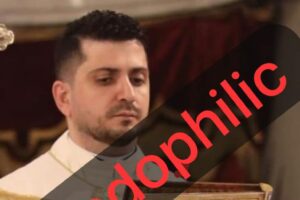
ARMENIA — Pope Francis and the papacy still have traces of a crusader mentality, Turkey’s deputy prime minister, Nurettin Canikli, said at a Saturday June 25 press conference, responding to the pope’s use of the word “genocide” just hours after touching down on Armenian soil.
Readers will recall that, during his address to the Armenian president and civil dignitaries on Friday, June 24, Pope Francis departed from his prepared text to call the massacre of 1.5. Armenians by the Ottoman Turks between 1915-1917 a “genocide.”
Fielding questions from reporters on Saturday, Turkey’s deputy prime minister criticized the Pope’s statement, saying his comment has no foundation in historical truth. “First of all, the Pope’s statement is very unfortunate,” he said.
“Like the picture we see with Britain’s departure from the European Union (EU), unfortunately signs of crusaders’ mindset and all of its reflections can be seen both in the Pope and the activities of the papacy,” Canikli said, according to Reuters. One of the points of contention in the “Brexit” referendum was whether Britain should be backing Turkey’s wish to join the EU.
“The Pope’s statement is no different,” the Turkish deputy prime minister continued. “It is not an objective statement, it is not consistent with reality. Everybody knows this, all of us know, the whole world knows this. Armenians also know this.”
Canikli also mentioned the German parliament’s recent approval of a motion recognizing the Armenian genocide, saying it, too, has no historical basis, but is purely politically motivated. Turkey, he recalled, denies there was a genocide but recognizes that there were losses on both sides during World War I.
Vatican spokesman, Fr. Federico Lombardi SJ, responded to the criticism on Sunday, saying there is “nothing of the spirit of the crusade” in the Pope’s words but a “spirit of peace, of building bridges and not wars.”
Fr. Lombardi invited people to “view correctly what the Pope says,” and see that the Holy Father has nothing against the Turkish people but instead has a great “desire for reconciliation” between Armenians and Turks.
While the Turkish deputy prime minister’s words may seem harsh, they are in no way comparable to the action Turkey took in April 2015, directly after the commemoration of the centenary of the Armenian genocide in St. Peter’s Basilica, presided over by Pope Francis in the presence of the Catholicos Karekin II and Armenia’s president, Serzh Sargsyan.
On 12 April, the Apostolic Nuncio to Turkey, Antonio Lucibello, was summoned by the government, and the Turkish ambassador to the Holy See was called back to Ankara.
Events culminated the next day, on April 13, when the Turkish ambassador to Holy See, Mehmet Paçaci, issued a statement calling the commemoration “an unacceptable manipupolitical instrumentalization” on Francis’ part, saying it is “questionable from all points of view, based on prejudice, distorts history and focuses the pain suffered in Anatolia during the unique circumstances of World War I, on the faithful of one single religion.”
Pope Francis again set aside diplomatic sensitivities with Turkey on Sunday, when he signed a common declaration with the Armenian Catholicos, Karenkin II, at the Apostolic Palace in Etchmiadzin.
In the declaration, the two leaders expressed their gratitude for the “grace of being together at a solemn liturgy in Saint Peter’s Basilica in Rome on 12 April 2015.” On that occasion, the declaration states, “we pledged our will to oppose every form of discrimination and violence, and commemorated the victims of what the Common Declaration of His Holiness John-Paul II and His Holiness Karekin II spoke of as ‘the extermination of a million and a half Armenian Christians, in what is generally referred to as the first genocide of the twentieth century’ (27 September 2001).”















